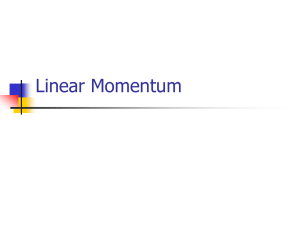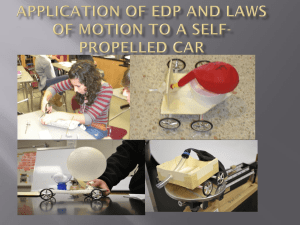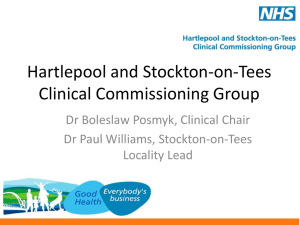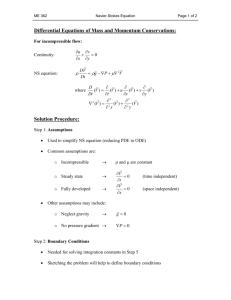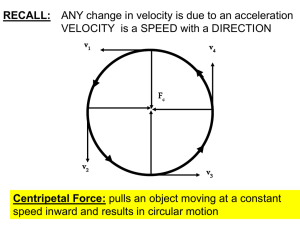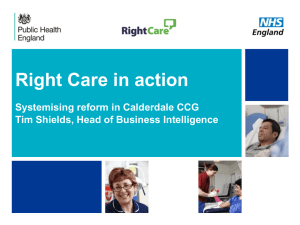(Attachment: 8)Report - Stockton-on
advertisement
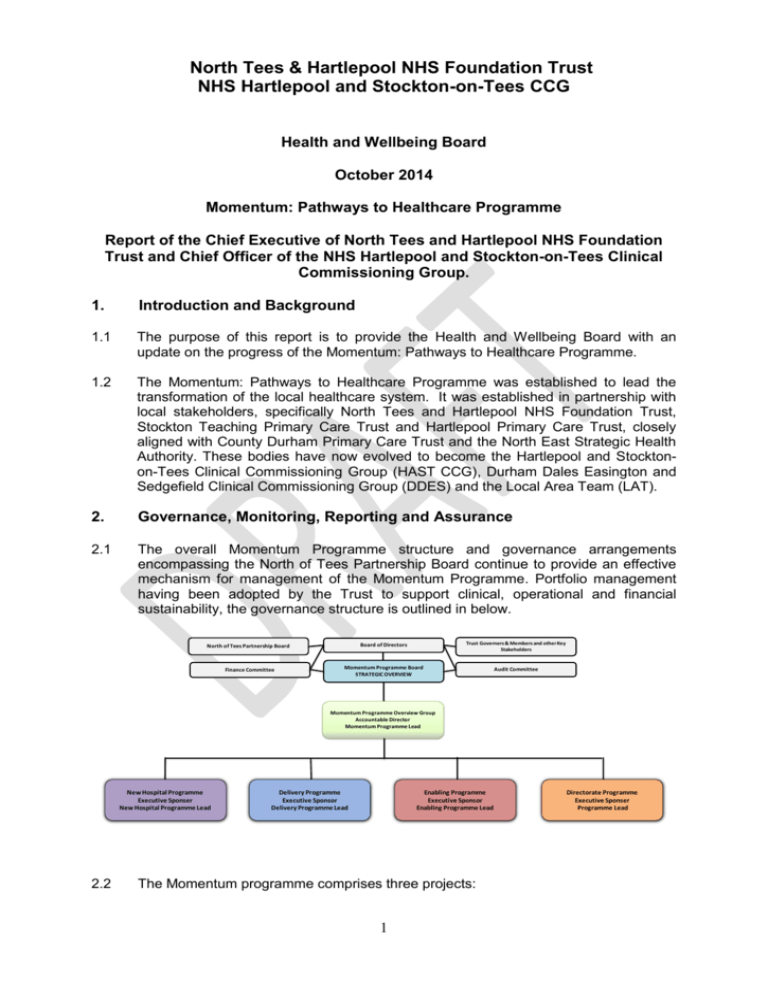
North Tees & Hartlepool NHS Foundation Trust NHS Hartlepool and Stockton-on-Tees CCG Health and Wellbeing Board October 2014 Momentum: Pathways to Healthcare Programme Report of the Chief Executive of North Tees and Hartlepool NHS Foundation Trust and Chief Officer of the NHS Hartlepool and Stockton-on-Tees Clinical Commissioning Group. 1. Introduction and Background 1.1 The purpose of this report is to provide the Health and Wellbeing Board with an update on the progress of the Momentum: Pathways to Healthcare Programme. 1.2 The Momentum: Pathways to Healthcare Programme was established to lead the transformation of the local healthcare system. It was established in partnership with local stakeholders, specifically North Tees and Hartlepool NHS Foundation Trust, Stockton Teaching Primary Care Trust and Hartlepool Primary Care Trust, closely aligned with County Durham Primary Care Trust and the North East Strategic Health Authority. These bodies have now evolved to become the Hartlepool and Stocktonon-Tees Clinical Commissioning Group (HAST CCG), Durham Dales Easington and Sedgefield Clinical Commissioning Group (DDES) and the Local Area Team (LAT). 2. Governance, Monitoring, Reporting and Assurance 2.1 The overall Momentum Programme structure and governance arrangements encompassing the North of Tees Partnership Board continue to provide an effective mechanism for management of the Momentum Programme. Portfolio management having been adopted by the Trust to support clinical, operational and financial sustainability, the governance structure is outlined in below. North of Tees Partnership Board Board of Directors Trust Governers & Members and other Key Stakeholders Finance Committee Momentum Programme Board STRATEGIC OVERVIEW Audit Committee Momentum Programme Overview Group Accountable Director Momentum Programme Lead New Hospital Programme Executive Sponser New Hospital Programme Lead 2.2 Delivery Programme Executive Sponsor Delivery Programme Lead Enabling Programme Executive Sponsor Enabling Programme Lead The Momentum programme comprises three projects: 1 Directorate Programme Executive Sponser Programme Lead Service transformation project Primary and community estate project Hospital capital planning project These are supported by three additional work streams: Financial assessment, compliance and affordability Workforce strategy Communication and engagement 2.3 The strategic aims are to develop integrated care pathways and expand the portfolio of services to provide integrated care for the people of Easington, Hartlepool, Sedgefield and Stockton providing equal access to acute care and care as close to home as possible. 2.4.1 These will be achieved by the transformation of services by continually reviewing, improving and developing healthcare services to respond to the needs of the community by the North of Tees Partnership Board. In line with evidence based guidelines the proposed developments will enhance quality, clinical effectiveness and patient experiences whilst improving clinical outcomes. 2.5 As the programme continues to develop plans are consistently reviewed to ensure alignment with the Joint Strategic Needs Assessment (JSNA) and HAST CCG Clear and credible plan. 2.6 The Momentum: Pathways to Healthcare Programme continues to provide the overarching framework to enable the delivery of health and social care services across the local health economy to increasingly provide care closer to home as and where clinically appropriate. 2.7 Planning for the capacity to be delivered which underpins the Momentum programme reflect: Anticipated population growth of 2.9% overall between 2012 and 2017 with the proportion of the population aged 85 or more growing from 2.0% to 2.4% over the same period Improvements in length of stay and other initiatives which will reduce the demand for inpatient beds reducing the requirement by 20% Wherever possible, services will be delivered from community locations, reducing the need for patients to travel to hospital, and the the provision of additional expensive hospital estate. The original capacity model was refreshed in 2013 and will be reviewed on an annual basis to ensure the underlying assumptions remain relevant. 3. Progress Update 3.1 The programmes within the portfolio are aligned within the overall Momentum: Pathways to Healthcare Programme taking forward the development of phase two of Service Transformation coordinated with the planning for the Better Care Fund and working toward the development of the New Hospital and associated Primary and Community estate and services. 3.2 These programmes build on the successful implementation of Service Transformation Phase 1 which saw the centralisation of Critical Care, Acute Medical, Complex Surgical and associated support services onto the University Hospital of North Tees 2 site, and the establishment of the Holdforth Unit at the University Hospital of Hartlepool. A full evaluation of Service Transformation Phase 1 has been completed, with a summary presented to a joint overview group set up as a result of the recommendations made by the joint scrutiny committee, with membership from the local councils and Healthwatch. 3.3 Planning for the next phase of Service Transformation is underway within the framework of the Trust’s Clinical Services Strategy to continually improve and develop services and will encompass integrated pathway development spanning hospital, community and integration with primary and social care. These initiatives are also integral to the planning for the implementation of the Better Care Fund being undertaken with partners across the local health economy. The Clinical Services Strategy is represented in the following diagram: The key elements provide appropriate focus on the patient care pathways, and will support the development of further integration across health and social care in line with the Better Care Fund. Work by the King’s Fund has already demonstrated that areas with well-developed integrated services for older people have lower rates of acute admission and bed use. This results in the potential associated movement of funds from the acute sector to support patients in alternative service provision Community renaissance has established an infrastructure for community services which, subject to potential changes identified as the new models are developed, provide interventions in support of the full range of integrated pathways. 3.4 Service Transformation Phase 2 will oversee the implementation of pathway and service changes in the following areas: The Long Term Condition Integrated Care Pathways under development are: Respiratory End of Life Care Frail Elderly and Dementia Diabetes 3 Cardiology Rheumatology Stroke Long Term Neurological Conditions Other developments will address the pathways in the other elements of the clinical Services Strategy, namely: Planned Care Unplanned Care Women’s and Children’s care Diagnostic and Support Services Step Up/Step Down service provision 3.4.1 Each project is being developed involving all appropriate stakeholders from across the sector to ensure they are patient focussed and are developed with the full engagement of clinicians from the Trust, commissioners, primary care and social care service providers as well as continuing dialogue with the local councils and public. 3.4.2 Key to the delivery of the Momentum vision of providing care closer to home will be the availability of appropriate primary and community care facilities. The trust is working closely with the CCG in defining the requirements for a community based facility in Stockton, to complement the use of existing facilities such as One Life Hartlepool, Peterlee Community Hospital, and other community and general practice premises. 3.5 The key elements of the Better Care Fund relevant to Stockton, that support the delivery of Momentum are: 3.5.1 Stockton Borough Council Multidisciplinary integrated service Improving pathways of care for dementia Enabling schemes o 7 day working o Joint assessments o Digital technology o Narrowing health inequalities o ICT systems and data sharing 3.6 The New Hospital programme 3.6.1 The New Hospital Programme continues to progress the business case. The Trust met with DH, Monitor, the CCG and NHS England and as a result of that meeting the Trust has been reviewing the current scheme, and the size of the new build to ensure alignment with other recently agreed schemes nationally. In addition the CCG has been required to confirm their continued commitment to the scheme given the need to minimise risks to the Trust of the PF2 scheme. NHS England were also requested to provide written commitment to the New Hospital and provide assurance to DH that this is the required solution for future healthcare across the area. A decision on the New hospital is anticipated soon. The process thereafter would be the commencement of the procurement phase anticipated to take circa 18 months, then build phase for circa 32 months. 4 4. Conclusion 4.1 The overall Momentum Programme structure and governance arrangements encompassing the North of Tees Partnership Board continue to provide an effective mechanism for management of the Momentum Programme, with Portfolio management having been adopted by the Trust to support clinical, operational and financial sustainability. 4.2 The programmes of work within the Momentum: Pathways to Healthcare Programme are now building on the successful implementation of Service Transformation phase one and with partners from across the sector taking forward the development of phase two of Service Transformation, coordinated with the planning for the Better Care Fund and working toward the development of the New Hospital and associated Primary and Community services. 5. Recommendations 5.1 The Health and Wellbeing Board is asked To receive this report and note the progress and governance arrangements. To note the successful implementation and final review of Service Transformation phase one and the development of Service Transformation phase two aligned to the planning for the Better Care fund and development of the New Hospital. To note the collaborative working relationships with partners across the sector Alan Foster Chief Executive North Tees & Hartlepool NHSFT Ali Wilson Chief Officer Hartlepool & Stockton Clinical Commissioning Group October 2014 5
